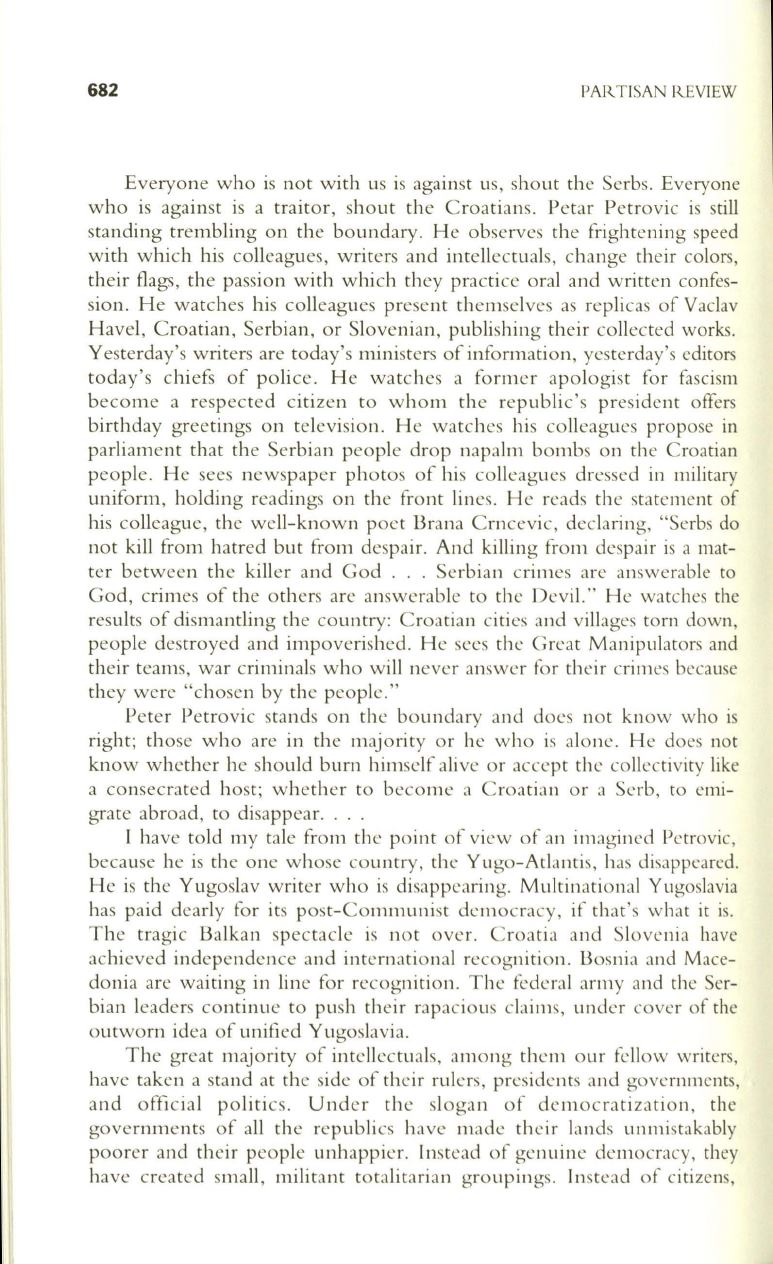
682
PARTISAN REVLEW
Everyone who is not with us is against us, shout the Serbs. Everyone
who is against is a traitor, shout the Croatians. Petar Petrovic is still
standing trembling on the boundary. He observes the frightening speed
with which his colleagues, writers and intellectuals, change their colors,
their flags, the passion with which they practice oral and written confes–
sion. He watches his colleagues present themselves as replicas of Vaclav
Havel , Croatian, Serbian, or Slovenian, publishing their collected works.
Yesterday's writers are today's ministers of information, yesterday's editors
today's chiefs of police. He watches a former apologist for fascism
become a respected citizen to whom the republic's president offers
birthday greetings on television . He watches his colleagues propose in
parliament that the Serbian people drop napalm bombs on the Croatian
people. He sees newspaper photos of his colleagues dressed in military
uniform, holding readings on the front lines. He reads the statement of
his colleague, the well-known poet Brana Crncevic, declaring, "Serbs do
not kill from hatred but from despair. And killing from despair is a mat–
ter between the killer and God ... Serbian crimes are answerable to
God, crimes of the others are answerable to the Devil." He watches the
results of dismantling the country: Croatian cities and villages torn down ,
people destroyed and impoverished. He sees the Great Manipulators and
their teams, war criminals who will never answer for their crimes because
they were "chosen by the people."
Peter Petrovic stands on the boundary and does not know who is
right; those who are in the majority or he who is alone. He does not
know whether he should burn himself alive or accept the collectivity like
a consecrated host; whether to become a Croatian or a Serb, to emi–
grate abroad, to disappear. ...
I have told my tale from the point of view of an imagined Petrovic,
because he is the one whose country, the Yugo-Atlantis, has disappeared.
He is the Yugoslav writer who is disappearing. Multinational Yugoslavia
has paid dearly for its post-Communist democracy, if tl1:lt 's what it is.
The tragic Balkan spectacle is not over. Croatia and Slovenia have
achieved independence and international recognition. Bosnia and Mace–
donia are waiting in line for recognition. The federal army and the Ser–
bian leaders continue to push their rapacious claims, under cover of the
outworn idea of unified Yugoslavia.
The great majority of intellectuals, among them our fellow writers,
have taken a stand at the side of their rulers, presidents and governments,
and official politics. Under the slogan of democratization, the
governments of all the republics have made their lands unmistakably
poorer and their people unhappier. Instead of genuine democracy, they
have created small, militant totalitarian groupings. Instead of citizens,


